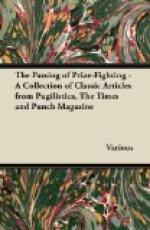There is a story current, turning on these events, of a young German officer and an official correspondence. It just possibly may be true, since even among such a rotten lot there might conceivably have been one tolerable fellow. The Higher Command had been much intrigued as to a church window, wanting to know (in writing) exactly why and how it had been broken; or rather, as it was the German Higher Command, exactly why and how it had been allowed to remain unbroken. You know how these affairs develop in interest and excitement as the correspondence passes down and down, from one formation to another, and what an air of urgency and bitterness they wear when they reach the last man. In this case the young German subaltern, who had no one else below him on whom to put the burden of explaining in writing, took advantage of his position, and wrote upon a slip, which he attached to the top of the others: “To Officer Commanding British Troops. Passed to you, please, as this town is now in your area....”
Probably the tale isn’t true, for if the officer was a German he must have had German blood in him, and if he had German blood in him there couldn’t be room for anything else, certainly not for a sense of humour.
We stayed longer than we should have done; this was an occasion upon which one could not insist on the limit of ten handshakes per person. I was delayed also by the Institutrice, who wanted to borrow my uniform, so that she might put it on and so be in a position to start right off at once, paying back. She meant it too, and I should not be surprised to hear that she’s been caught doing it by this time. Her mother was there in great form. Asked for her opinion of the dear departed, she said she had already told it to themselves and saw no reason to alter it. “They make war only on women and children; they are laches.” My N.C.O. got out his pocket-dictionary to discover the exact meaning of the word. She told us he needn’t trouble; it meant two months’ imprisonment. She had a face like a russet apple—a very nice russet apple, too.
We didn’t get away before dark, and we found it very hard to discover our way about new country when large hunks of it were missing altogether. One of the party would walk on to find the way, and later I would go forth to find him. We could see the road stretching away in front of us for kilometres; but between us and it there would be twenty yards of nil.
However, the car eventually learnt to stand on its back wheels, climb hedges and make its way home across country, having confirmed its general opinion of the Bosch, that he is only good at one thing, and that is destroying other people’s property. I am now back in comfort again, and able to remember your suffering. I send herewith a slice of bully beef (one) and potatoes (two), hoping that they will not be torpedoed, and urging you to hang on, for we are now beginning to think of moving towards Germany, if only to see, when we get there, exactly what the Frenchman has been evolving in his mind all this time.




